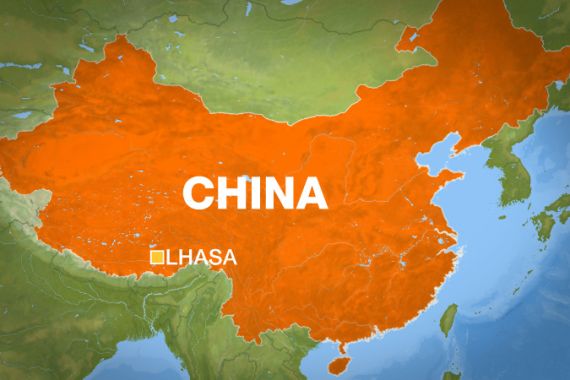Death by self-immolation reported in Tibet
China’s official news agency confirms two incidents of men setting themselves on fire in tightly guarded capital Lhasa.

Two Tibetan men set themselves on fire in the Tibetan capital, Lhasa, and one died, China’s official Xinhua news agency has said, confirming an earlier report.
Sunday’s incident was the first such protest to take place the in tightly guarded city, according to Xinhua, which said police put the flames out “in minutes” and one of the men survived and was in a stable condition.
Radio Free Asia, the US-based broadcaster, said earlier that the men were monks and said they set themselves on fire outside the Jokhang temple, a renowned centre for Buddhist pilgrimage in Lhasa.
‘Settled quickly’
Xinhua said the survivor was from Aba county in southwest China’s Sichuan province, which borders the Tibet Autonomous Region, and named the dead man as Tobgye Tseten, from Gansu province in China’s northwest.
It said the incident was “settled quickly” and order restored, citing the local Communist party publicity department.
Aba is home to the Kirti monastery, which has become a flashpoint for protests against Chinese rule of Tibetan-inhabited areas.
More than 30 people, many of them Buddhist monks and nuns, have set themselves on fire since the start of March 2011 in protest at what they say is religious and cultural repression.
Most have taken place in heavily Tibetan areas of China, but only one had occurred in Tibet itself and none in the capital.
Chinese authorities have confirmed some of the self-immolations over the past year but not all.
Protests have become rare in remote Tibet and Lhasa in particular because of tight police security that has blanketed the area since anti-government riots erupted in Lhasa in 2008.
Radio Free Asia reported on Monday that Lhasa was under heavy police and paramilitary guard following the immolations and that the situation was very tense.
‘Separatist’ incident
Xinhua news agency quoted a senior official with the regional communist government as saying it was a separatist incident.
“They were a continuation of the self-immolations in other Tibetan areas and these acts were all aimed at separating Tibet from China,” Xinhua quoted Hao Peng, secretary of the Commission for Political and Legal Affairs of the CPC Tibet Committee, as saying in a statement on Sunday.
China says Tibet has always been part of its territory, but many Tibetans say the Himalayan region was virtually independent for centuries until Chinese troops invaded in the 1950s.
China blames the exiled Tibetan spiritual leader, the Dalai Lama, for fanning anti-government sentiment and routinely purges monasteries and nunneries, where support for the Dalai Lama and Tibetan independence runs high.